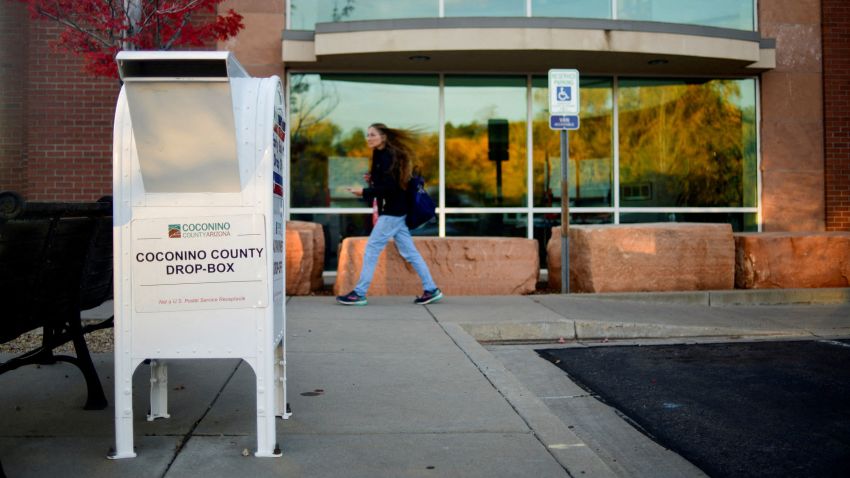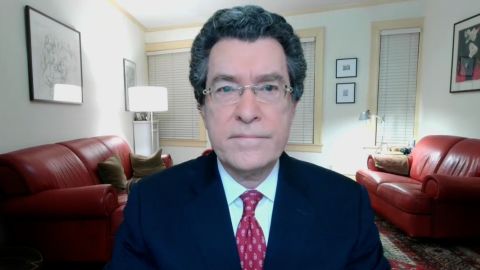
Opinion: It’s not OK for armed election deniers to intimidate voters


Judge restricts how right-wing group can patrol drop boxes
04:13 – Source: CNN
Editor’s Note: Norman Eisen is a political law expert who advised the White House on election law when he served as President Barack Obama’s ethics czar. Taylor Redd is a researcher focusing on national elections. The views expressed in this commentary are their own. Read more opinion at CNN.
CNN —
Major victories in two separate voting rights cases this week stunted efforts to harass early voters in Arizona and overwhelm election offices in Michigan with frivolous challenges.

In the first of those cases, Clean Elections USA – an organiztion motivated by the falsehood that there was a “coordinated effort to stuff” ballot boxes in 2020 – was ordered by a district court judge on Tuesday to refrain from engaging in conduct around Arizona drop boxes that voters found to be intimidating.

Clean Elections USA founder Melody Jennings recruited individuals through her network of election deniers on Truth Social. A lawsuit alleged that armed individuals, whom Jennings referred to as “our people,” were monitoring those drop boxes. They carried weapons while surveilling them, according to the lawsuit, and focused their attention on Arizona’s Maricopa county, the state’s most populous county, where a third of the inhabitants are Hispanic or Latino. (In response to news about individuals carrying firearms, Jennings posted that she “would not make this choice & I prefer people in my group not choose this.”)
The people taking part in such activities sometimes are motivated by debunked conspiracies like the one depicted in the film “2000 Mules” – and their efforts appear to have intimidated some voters. Indeed, Arizona voters submitted sworn statements to the court that the ballot box surveillance had a chilling effect on their inclination to vote by absentee ballot. In at least one documented instance, the individuals surveilling ballot drop boxes took photographs of a voter’s license plate number.
A Trump-appointed judge on Tuesday ordered Clean Elections USA to stop certain forms of surveillance of voters. Under the court ruling, they are not allowed to come within 75 feet of a ballot drop box, yell at voters within that radius or follow voters – even outside of the 75-foot perimeter. And they are prohibited from openly carrying firearms or visibly wearing body armor within an expanded scope of 250 feet from drop boxes. Clean Elections USA also was ordered to cease posting or disseminating personal information about individuals they baselessly accuse of voter fraud.
The group also was ordered to refrain from making false statements about Arizona voter fraud laws. The judge instructed the group to post the following statement on its website and Truth Social page: “It is not always illegal to deposit multiple ballots in a ballot drop box. It is legal to deposit the ballot of a family member, household member, or person for whom you are the caregiver. Here are the rules for ballot drop boxes by which I ask you to abide” with a copy of Arizona law and the judge’s order. Jennings must also post similar language on the Truth Social page @TrumperMel through Election Day. A lawyer for Clean Elections USA and Jennings said the group was likely to appeal on First Amendment grounds.
Meanwhile, in another victory for voting rights, the Michigan Republican Party and Republican National Committee lost their case Wednesday against the city of Flint’s election clerk and commission.
Flint appeared to be cooperating with a Republican request to hire more GOP poll workers. In late October, the Michigan Republican Party and Republican National Committee had sent city election officials a letter with the names of interested Republicans candidates, and the city hired approximately 50 more Republican poll workers, bringing the number to 120 Republican poll workers out of the 682 total.
A few days later, the City of Flint sent the Michigan Republican Party and Republican National Committee an update reflecting the new hires and stating that the city intended to contact remaining individuals on the list to provide an equal number “as nearly as possible.” However, they added, that the list the Republicans provided “includes duplicative names” and individuals who are “already working as election inspectors in other jurisdictions.”
The Michigan Republican Party and the RNC sued Flint, claiming that their avowed efforts to bring more Republican poll workers in its precincts were not sufficient. The suit cited a state statute requiring boards of election to “appoint an equal number, as nearly as possible” of poll workers from each major political party.
Flint won the legal action on Wednesday on the question of “standing”: Under state statute, the grievance process is only available to the county chairs of major parties. The lawsuit circumvented that requirement.
Even though the case was dismissed on a technical ground, it marked an important milestone. The judge, who made extremely short work of the case, appeared disinclined to indulge the suit. Flint is now complying with the law. And even parties with standing will likely face tough sledding if they file a similar suit in the future.
Why did the GOP bother to bring this clearly non-meritorious suit here and now? We spoke to Michigan elections expert Aghogho Edevibe who told us that it is common across Michigan for predominantly Republican areas to have predominantly Republican poll workers, and vice versa with Democratic areas.
Moreover, this case was brought at the last minute when, as Flint put it in their court papers, “there is no time or staff available to conduct another day of election school” for new poll workers. And by targeting Flint, the GOP was picking on a city with majority Democratic and Black populations. The inferences of, as Flint wrote, “political theatre” for ugly partisan purposes are inescapable.
Nor do the hard questions for the GOP stop there. Michigan has been a target for the GOP’s so-called “precinct strategy.” It is designed to surge more Republicans, including potential election deniers, into the voting system. Indeed, the GOP nominee for secretary of state, an open election denier, is pushing a different but equally baseless attack on the election system in Detroit. Under the circumstances, it is fair to ask whether the Flint effort was part of the GOP’s election-denial strategy.
Whatever the motivation, it was a flop.
These victories can provide some peace of mind to voters in Arizona, Michigan and across the nation. They show that – just as they did with challenges during our last election – courts will enforce the law to protect voting rights and the election system.
With the two cases outlined here – as was the case in 2020 – the courts were a bulwark against attempts to undermine the election. These cases suggest that rule of law is still functioning to protect our democracy against drop box intimidators, election deniers and their ilk.
All the same, election denial and voter intimidation efforts are well-organized across the United States. It is critically important to continue to monitor legal developments leading up to the midterm election to preserve a tradition all Americans should be proud of: free, fair, secure and accurate elections.
Source: https://www.cnn.com/2022/11/04/opinions/election-deniers-intimidate-voters-midterms-eisen-redd/index.html

















